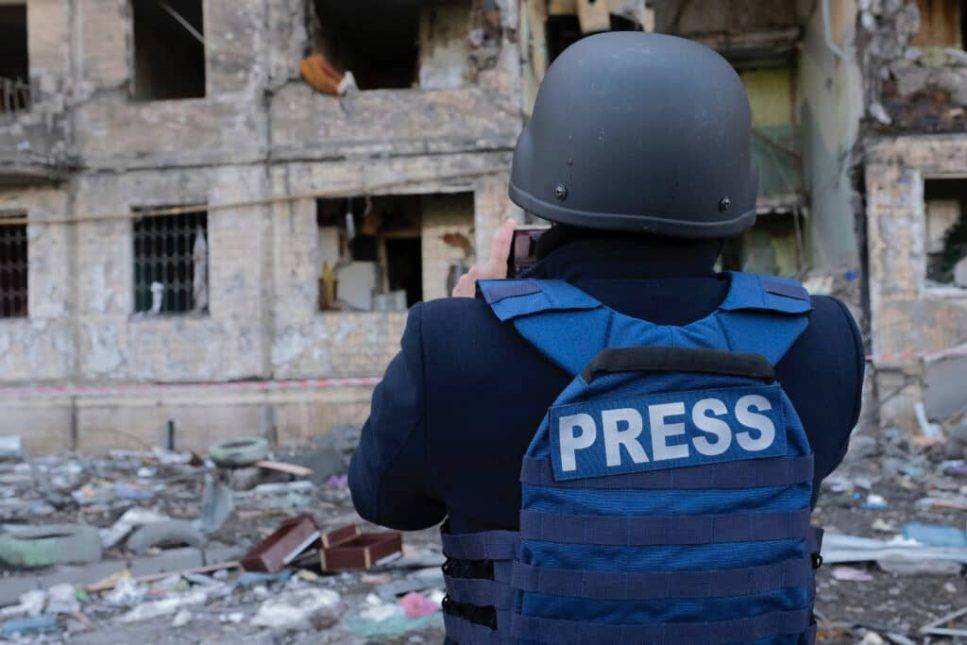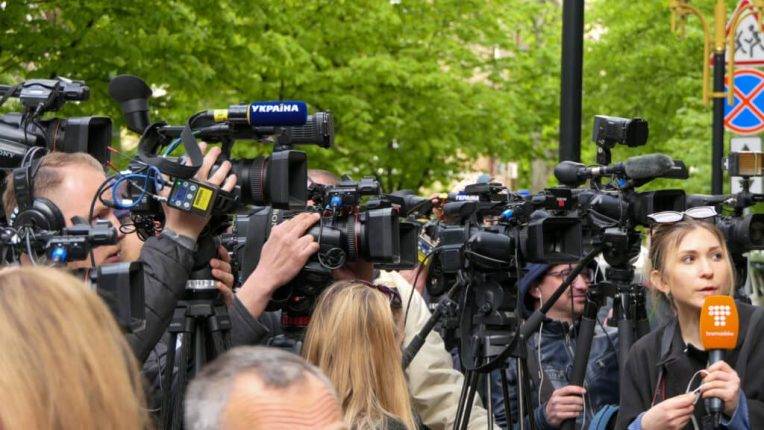
‘Journalism is very necessary. It’s helpful and it really works’: how correspondents cover reality during the war
05/06/2023
By definition, journalism is a profession that deals with major challenges. Irrespective of countries and regions, journalists face similar problems. However, in covering conflicts, the value of truthful information grows, and information can be a weapon.
Curiosity transforms observers into journalists
Being a war correspondent is often not a choice but a necessity. This story is also about Illia Ponomarenko, who first faced the war in 2014 when he was a student, and now the full-scale invasion in 2022 as one of the journalists of The Kyiv Independent. His hometown – Volnovakha in Donetsk Region – was destroyed by Russians during the full-scale war.
“Right now, we have a full-fledged hard conventional war. Back then, it was different,” Illia recalls of the start of the war in 2014, when he was a student in Mariupol. “I was basically a civilian living in a chaotic city. For several months, the city wasn’t controlled by the Ukrainian government. And from the inside, it wasn’t ruled by anyone but pro-Russian militants. And of course, we were in the spotlight. And since I was a student in international relations in a small city in Ukraine, there wasn’t much hope to be anything bigger than a student.”
Illia said he and his classmates were extremely excited when they had a chance to meet a foreigner visiting their university. “So, I started talking to the BBC. On the BBC’s website, you can just leave your e-mail address so that they can contact you if you are witnessing the events described in the articles. And they did contact me and talked to me about the things that I was seeing in Mariupol in those days. And they persuaded me to go live in the middle of the night on BBC radio. They called me time after time, especially the Scottish Service. So, one step after another step, this made it into this media world, especially the English language media world,” the journalist says.
Illia Ponomarenko also thought about joining the military, but gave up on the idea because of health issues. Instead, he got into journalism and started being interested in other international issues – for example, the Israeli-Palestinian conflict, the situation in the Middle East and Africa.
His story is somewhat similar to the experience of Maya Gebeily, who works at Reuters and covers events in Lebanon, Syria, and Jordan and post-conflict dynamics in Yemen and Iraq.
“I think the thing that really makes everybody a journalist is curiosity. So, we always hear about somebody else’s experience and think: ‘Oh, I’m interested in doing that because it’s something I’ve never seen before. I don’t know about this. So, I want to do this.’ I had wanted to be a diplomat for a long time and thought that it was going to be a really great way to see the world. And then, having Lebanese roots, I spent every summer in Lebanon. And I was going to work for a bit as a correspondent. And it was the summer of 2013, ten years ago, a period that saw some of the worst bombings Beirut had seen for years,” the international journalist recalls.
This experience was a decisive event in her career – she felt she had to cover the things she saw “here and now”.
“I remember the first time I went to cover the aftermath of one of these explosions. It was a twin suicide attack at two mosques in Tripoli, in northern Lebanon. I remember it was the first time that I saw body parts. I smelled what it smelled like to be in a place like that where there had been so much death. And I remember being really surprised that it didn’t scare me. It was more that I really wanted to understand as much as I could about what had led us to this moment. And that was the moment at which, I think, I realised that I’m much more interested in being as close to the ground as possible. And sometimes, diplomats, unfortunately, don’t get that kind of exposure and don’t get that kind of access,” Maya Gebeily notes.
PTSD and emotional burn-out
War correspondents reveal the truth in covering the life of people on the frontline, human rights infringement, and humanitarian crises. They are the voices for those who cannot tell their stories by themselves. However, they face the same challenges as representatives of other professions: they constantly have to develop their skills and keep pace with new technology.

“The more you work, the further you progress, the more demands you have on your knowledge. Because being a reporter, especially a war reporter, demands that you know everything about weapons, about events, about every single thing. And the information rolls on and on. New weapons, new tactics. You have to at least generally understand all those things. So, learning never stops,” Illia Ponomarenko says.
But expertise is only part of the story. During great upheavals, documenting and covering reality is a huge challenge.
“Who would want to be in the first line with the Ukrainian military breaking through Bucha? No sane person would want that. But in Ukraine, we had a lot of foreigner journalists, basically all the world’s top reporters. And they were fighting for the chance to join the military and see that. So, this is a very special nature of the profession, and it takes a lot of spiritual strength,” the Ukrainian journalist says.
Many journalists have gone through stressful situations and seek help from psychotherapists or even speak about symptoms of post-traumatic stress disorder (PTSD). “If you work in your own country that is at war, of course, you invest 150% of yourself in this and you inevitably burn out,” Illia Ponomarenko says.
Ponomarenko now lives in Bucha, in the Kyiv Region, where the Russians committed genocidal acts until the town was liberated on 31 March 2022. The name of the town has become a symbol of the suffering of the Ukrainian people.
“There is a limit of human capacity to work like that. So, the biggest challenge for me right now is just being extremely tired, but we are very far from the end of the war,” the journalist says.
Women’s role and responsibility
Despite the challenges, Maya Gebeily believes that being a woman has helped her gain opportunities to get the information she needed and cover people’s stories. For example, explaining her work with women who had suffered at the hands of Islamic State militants, she points out that women who had just escaped from Islamic State were not ready to speak to a foreign male reporter. “So, being a woman and, I think, more importantly, speaking Arabic and being able to communicate with them directly made such an enormous difference,” she says.

Moreover, her young age didn’t hinder her, but actually helped her to communicate openly and have credibility. “Whether it was in Iraq or Syria, we spoke to a lot of fighters who were quite young, who were either still below 20 years old or who were in their very early 20s. And I felt like, probably, I reminded them of a sister or a friend of somebody who’s back home, somebody who they can actually speak to. And so, they might open up or they might just be more interested in speaking to me,” the journalist explains.
However, personal safety and working with sources and people highlighted in her stories is only part of her profession. Maya Gebeily manages a team of reporters. So, she thinks not only about herself but also about other reporters working in Lebanon, Syria, and other countries.
Illia Ponomarenko agrees that women reporters can have a certain edge, and recollects his own experience. “The conventional thinking might tell you that as a male reporter it’s easier for you to get deployed with combat units and go there. But on the ground, in reality, it often happens that soldiers might be more emotionally invested in having a very stubborn girl by their side. So, girls also do a lot of job on the frontline,” he says.
Both reporters also highlighted the impact of another key characteristic of their profession – responsibility before the target audience, since a lot of journalists become very famous not only in foreign media, but also in social media.
“That’s about thinking twice or maybe three or four times before you say anything, before you tweet anything. Because starting from February last year, many of us here in Ukraine just found themselves in the spotlight, in front of the world’s eyes literally. Journalism is very necessary. It’s helpful. It really works. My small town of Bucha was exposed to global attention. What we, Ukrainians, were seeing, was exposed to global attention thanks to global media and to all the enthusiasm and presence. So, journalism will, hopefully, never die. So, there will be a lot of work to do,” said Illia Ponomarenko.
Author: Olga Konsevych
Article published in Ukrainian by Tsn.ua
Stories
-
Katarina Mathernova: If Ukraine had a human face and a human spirit, it would be 10-year-old Roman Oleksiv
-
A regional mission to drive social entrepreneurship: the story of Ksenia Kosukha
-
EU restores safe water supply for 100,000 Ukrainians affected by war
-
Promoting IT during the war: Lviv IT cluster and how EU4Digital helps
-
Frontline digitalisation: Kharkiv IT Cluster collaborations
-
How EU4Youth is driving opportunity and success among young Ukrainians